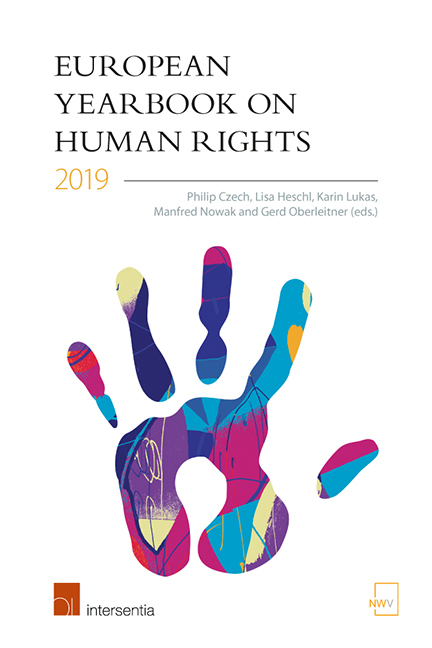Book contents
- Frontmatter
- Miscellaneous Frontmatter
- Editors’ Preface
- Contents
- List of Abbreviations
- List of Contributors
- PART I TOPIC OF THE YEAR
- PART II EU
- The Strange Case of Northern Ireland's Disappearing Rights in the EU-UK Withdrawal Negotiations
- Can Reasonable Accommodation Safeguard the Employment of People with Disabilities?
- Whistleblowing in Europe: A New Era of Legal Protections
- A Critical Take on Opinion 1/15: Is the Glass Half Full or Half Empty?
- Absolute Rightlessness Sur Place through Excessive Externalisation
- Corporate Accountability Mechanisms in EU Member States for Human Rights Abuses in Third Countries
- PART III CoE
- PART IV OSCE
- PART V REPORTS FROM THE FIELD
- PART VI OTHERS
- PART VII BOOK REVIEWS
- Index
Can Reasonable Accommodation Safeguard the Employment of People with Disabilities?
from PART II - EU
Published online by Cambridge University Press: 24 January 2020
- Frontmatter
- Miscellaneous Frontmatter
- Editors’ Preface
- Contents
- List of Abbreviations
- List of Contributors
- PART I TOPIC OF THE YEAR
- PART II EU
- The Strange Case of Northern Ireland's Disappearing Rights in the EU-UK Withdrawal Negotiations
- Can Reasonable Accommodation Safeguard the Employment of People with Disabilities?
- Whistleblowing in Europe: A New Era of Legal Protections
- A Critical Take on Opinion 1/15: Is the Glass Half Full or Half Empty?
- Absolute Rightlessness Sur Place through Excessive Externalisation
- Corporate Accountability Mechanisms in EU Member States for Human Rights Abuses in Third Countries
- PART III CoE
- PART IV OSCE
- PART V REPORTS FROM THE FIELD
- PART VI OTHERS
- PART VII BOOK REVIEWS
- Index
Summary
ABSTRACT
The duty to provide reasonable accommodation is one of the most important measures to achieve equal opportunities of people with disabilities. Reasonable accommodation recognises the relevance of ‘impairment’, and it is designed to, inter alia, increase the employment of people with disabilities. The importance of this duty was such that it was configured in Article 5 Directive 2000/78 and as a key measure in the Convention on the Rights of Persons with Disabilities (CRPD). Thus, the duty to provide reasonable accommodation has become both a European and an international norm. In light of this, this contribution aims to analyse the European configuration of the duty to provide reasonable accommodation in the workplace for people with disabilities, and its role in the extinction of an employment contract. Specifically, this contribution seeks to assess the current configuration and effectiveness of reasonable accommodation, in light of the legal framework (Directive 2000/78) and its interpretation by the Court of Justice of the European Union (CJEU). Therefore, it will examine, at a European level, the possibilities offered by the configuration of reasonable accommodation, as a mechanism for the maintenance of employment and an obstacle to termination of employment contracts of people with disabilities.
INTRODUCTION
Improving the employability of people with disabilities has been an objective over the last few years, partly because of the rise in the social-contextual model of disability. In general terms, this paradigm rejects the individual model of disability, and views disability as a result of the difficulty of society in adapting to the needs of people with impairments. this paradigm refuses the individual assumption of the responsibility of disability, and stresses it as a difficulty of societies to provide accessible spaces for people. the social model of disability rejects the existence of individual limitations. the origin of the problem lies in society, conceived as a limiting entity that is incapable of responding to the needs demanded by people with disabilities. In this regard, the social model characterises disability as a situational phenomenon, resulting from the interaction between an impairment and a non-adapted environment, and proposes the promotion of autonomy and independence as a solution, abandoning the idea of normality and adopting accessibility and universal design as the main characteristics for achieving equal opportunities.
- Type
- Chapter
- Information
- European Yearbook on Human Rights 2019 , pp. 63 - 90Publisher: IntersentiaPrint publication year: 2019

